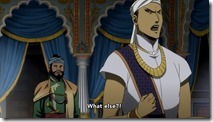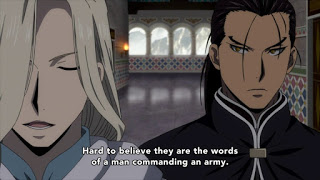 |
 |
 |
To a wise man, a foolish man is first and foremost an opportunity.
OP2: “Uzu to Uzu” (渦と渦) by NICO Touches the Walls
 |
 |
 |
 |
 |
 |
After a recap episode (frankly I didn’t mind one bit, given the craziness of the first week of a new season) Arslan Senki powers back into action with another episode densely packed with action and new plot developments. It carries with it a new OP and ED, and while neither are what I’d call exceptional (both are fine – I think the ED song is the better of the two) simply being rid of the wholly discordant first OP makes the whole exercise a massive trade-up.
I haven’t read this far in either the novels or the manga (I don’t even think the manga has gotten this far in the story), and I’ll admit I was surprised by the turn events took with regards to the invasion led by Sindhuran Prince Rajendra. What we saw last time showed us that he was an opportunist – taking advantage of the chaos in Pars to try and pad his own resume as a general, presumably. But it turns out there was a lot more to his story, which would prove crucial to events going forward.
What we saw this time showed us a Rajendra who’s all of a blowhard, and a bit of a fool. But he’s bold and fearless at least, and it turns out that for him, this invasion is a way to help him strengthen his claim to the throne of his country, which after the death of the king is embroiled in conflict of its own. Rajendra is the second prince (by a month – presumably polygamy is the norm among Sindhuran royals) and doesn’t think much of the first, Gadevi. For him, going after a child prince and a turbulent neighbor seems to be a way to make a lot of noise and embarrass his brother.
It doesn’t take a leap of judgment to realize that under the likes of Narsus, the opposition Rajendra faces will be more than adequate, even if he has a five-to-one advantage in numbers. Narsus calmly reminds the nervous Daryun of the three holy principles of warfare (in this mythology): “Heaven’s Time, Terrain Advantage and People’s Harmony”. Rajendra (even his own general seems to realize he’s making a mistake) is leading warm-climate troops through snow-covered mountains, and they’re mountains the defenders know encyclopedically – both the season and the battlefield are against him. And his men are on-edge, aware of the uncertainty they’ve left behind in Sindhura.
Daryun, Narsus and Kishward lead the 10,000 strong Peshawar army to battle with understandable confidence then – Arslan makes a dutiful protest at being left behind, but it’s obvious his value as a symbol exceeds his value as a military commander at this point. Just why does Hermes choose not to strike, knowing Arslan is left behind without his strongest protectors? We don’t know – nor do we know what precautions Narsus has taken against a possible repeat of Hermes’ earlier attempt on Arslan’s life. But the matter at-hand is the clash of the two armies.
Even knowing how to use the three principles against Rajendra, Narsus surely realizes that this invasion is a problem. Even in turning it back he risks losing men – and time – he can’t spare. But rather than sigh and accept that, Narsus hatches an ingenious plan to spin the invasion to Arslan’s benefit. Defeating the Sindhurans in battle is straightforward – Narsus splits his forces, uses the terrain to pincer the opponent, and wrecks their morale by staging a fake rear-guard attack by Gadevi’s men. Eventually he traps Rajendra’s main force on a frozen lake, the dangers of which even Rajendra isn’t blind to. But all of this is towards a larger goal than simply repelling the invasion – Narsus intends to force Rajendra into an alliance with Arslan, each of them helping the other seize control of their own nation.
It’s not a bad deal for Rajendra, but Narsus isn’t the sort to leave loose ends – he makes sure the prince has no choice but to accept it using liquor and blackmail. Arslan is the protagonist, and he’s a good one – the whole notion of whether he should have the throne mainly on the merits of kindness is an interesting one. But it’s Narsus who’s the prime mover in this story – he who continually drives the flow of pieces on the board. Sindhura is going to be no pushover – Gadevi’s vizier has placed a spy in Rajendra’s ranks and he doesn’t intend to give up his throne without a fight – and if nothing else, taking the time to deliver on his end of the deal first is going to delay Arslan’s dreams of liberating Ectabana considerably. But Narsus clearly sees this as an opportunity too useful to pass up, and he’s been proved right consistently enough that Arslan would be a fool to doubt him here.
 |
 |
 |
 |
 |
 |
 |
 |
 |
 |
 |
 |
 |
 |
 |
 |
 |
 |
 |
 |
 |
ED2: “One Light” by Kalafina
 |
 |
 |
End Card by Mashima Hiro:
 |











ferryyohanes96
July 13, 2015 at 1:58 pmthe fact that the indian man at the ED is not rajendra but the "spy" is quite intriguing to me.
Chrysostomus
July 13, 2015 at 7:03 pmIt's good to see a decently animated Arslan Senki this week, thank the good lord and that recap.
Is there anyone who could defeat Narsus in a battle of wits? Guy is too OP.
Yana Anastasova
July 13, 2015 at 7:25 pmAm I the only one who actually liked the first opening, in spite of its "inappropriateness"? Yes…? Well, I'll go sit in a corner then.
On a birghter note, I'm glad the second cour has kicked off in such dynamic fashion; plus, one of my favourite moments in the entire story's coming up, so that's got me twice as giddy. Rajendra seriously pisses me off on certain occasions, but I look forward to seeing how his interactions with the main group are handled in this adaptation. That, and, someone give Narsus a cookie (or better yet, a new set of art supplies)!